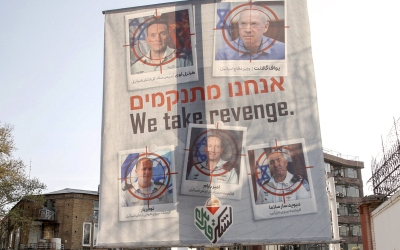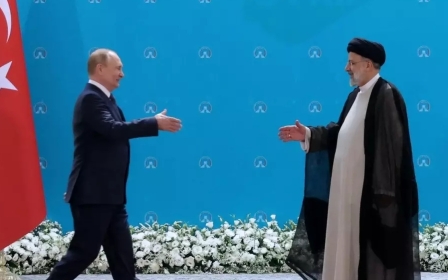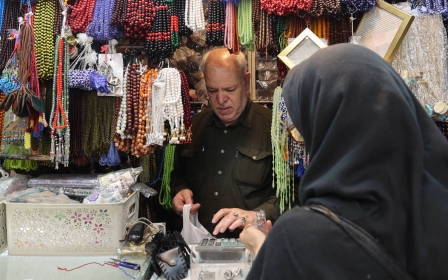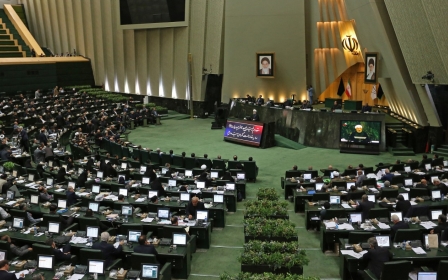The threat of war with Israel hangs over Iran as retaliatory strike looms
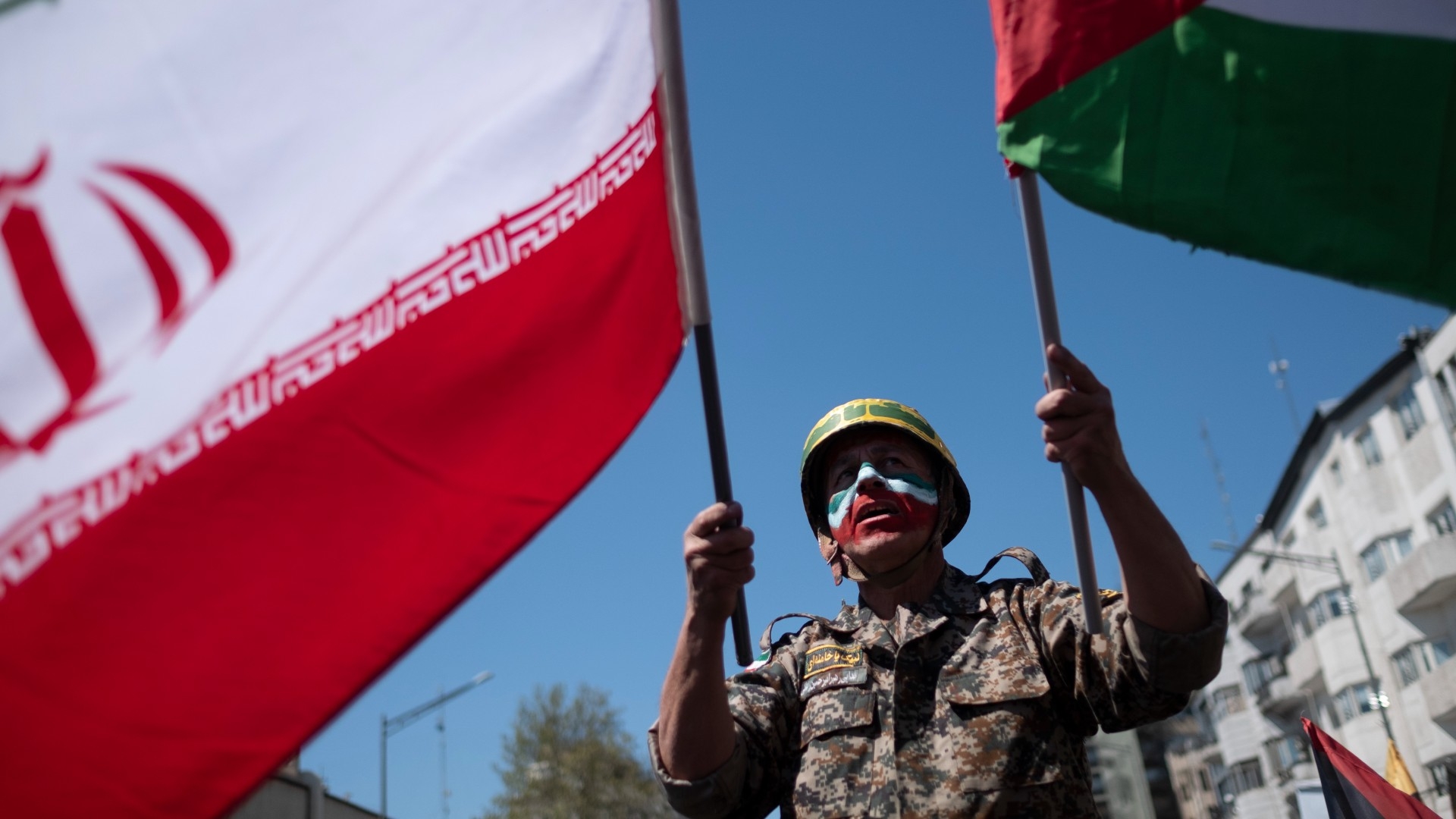
A cloud has been hanging over Iran for 11 days.
The Israeli bombing of Iran’s consulate in Damascus which killed a senior general and six other officers has Iranians fearing the Gaza war may be making its way to their shores.
In a speech to mark Eid al-Fitr, Supreme Leader Ayatollah Ali Khamenei stressed that embassies and consulates are considered sovereign territory. An attack on them is tantamount to an attack on Iran itself, he declared.
"The Zionist regime has made a grave mistake and must be punished - and will be punished," he said.
Though some Iranian officials have echoed those sentiments, there has been no further confirmation that retaliation is planned or what it would look like.
New MEE newsletter: Jerusalem Dispatch
Sign up to get the latest insights and analysis on Israel-Palestine, alongside Turkey Unpacked and other MEE newsletters
Iranian state TV, which is controlled by people appointed by Khamenei, has meanwhile continued to air normal programming.
News about the tensions between Israel and Iran over the Gaza war is barely making people’s screens. Instead, weather reports and Eid celebrations are being prioritised.
Things couldn’t be more different in Iran’s online media. There the focus is almost exclusively on the Gaza war and its fallout, largely relying on western media reports speculating on what Tehran might do.
Western countries have told their citizens in the region to be on high alert. Israel has indicated that it will strike back if Iran does attack.
And it remains unclear if a response will come from Iran directly, or one of its regional allies, such as Yemen’s Houthi movement, Lebanon’s Hezbollah, or Iraqi paramilitaries, all of which have targeted Israel over the past six months of war.
Some report that a response might be seen in the next two days. Others say nothing has been decided.
Faced with this onslaught of speculation, anxiety has spread through the Iranian public, who fear an all-out war being sparked with Israel, and perhaps even the United States.
'I am seriously worried about the war. I am afraid that famine will occur, prices will soar to the point where I cannot afford bread'
- Nahid, accountant
Masoud Golchin, a stock market trader, told Middle East Eye he knows all too well what havoc war can bring. Like all Iranians spoken to by MEE, his name has been changed for security reasons.
"As a 39-year-old Iranian, we witnessed the experience of eight years of war imposed on us by Iraq when we were children. After the war, we realised that many of the country's setbacks were due to the war, therefore I am very stressed," he said.
"The discipline of the country will be disrupted, repressions will increase, which means that every action and opposition to the Islamic Republic's policies will be labelled as caused by Israel."
Nahid, a 45-year-old accountant, worries that Iran’s already difficult economic situation will be made much worse. Severe US sanctions have compounded economic issues. Officially, inflation is 40 percent, though it is even higher on many essential goods.
Since the 1 April Israeli attack on Damascus, the Iranian rial has risen from 610,000 against the dollar to 660,000 on the black market.
"As a mother of two children, I am seriously worried about the war. I am afraid that famine will occur, prices will soar to the point where I cannot afford bread," Nahid said.
"During times of war, when unity is lacking, opportunistic thugs take advantage of the chaos to loot."
'Misery on all fronts'
There are some critics of the ruling establishment, however, who think there could be opportunities in crisis.
Mehran Razavian, a 35-year-old taxi driver, is one of them.
"To be honest, if it leads to the Islamic Republic being forced to make some positive changes, I would welcome the war," he told MEE.
"The situation is dire. The Islamic Republic is ill-suited for our country, and I would like to see it weakened so that it no longer oppresses our people. However, I am not in favour of Israel at all as I saw what it did to children in Gaza and I don't want a full-scale war as it would plunge us into a situation akin to Sudan."
However, most opponents of the establishment say any conflict would be disastrous for the country.
"I would not rejoice at a war, as it would bring misery on all fronts, especially economically and in terms of security," said a political journalist at a reformist-leaning daily newspaper.
"While dissatisfaction with the Islamic Republic runs high and some may view war as a solution, democracy cannot be established through warfare."
Indeed, while many Iranians may hate the government, they believe standing up to Israel is the right course of action.
Public opinion in Iran is anti-Israeli at the best of times, and Iranians have been appalled at the destruction of Gaza and the killing of more than 33,000 Palestinians.
Hossein Dehbashi, a renowned history documentary maker who is critical of the Islamic Republic, warned on X that “failing to retaliate to every blow only emboldens the opponent to strike harder”.
“Predators follow those who flee. Sometimes, peace demands standing firm and fighting,” he posted.
As ever when it comes to questions of Iran, Israel, and conflict, the nuclear threat has become part of the conversation.
Israel is believed to hold nuclear weapons, and Iran’s nuclear development programme has drawn scrutiny and pressure from the West – though it insists its activities are geared towards energy rather than weaponry.
Iran is estimated to have enough enriched uranium to make nuclear weapons in a matter of weeks. Khamenei has previously issued a fatwa against developing such arms.
"The ban on producing nuclear bombs may change," conservative cleric Mahdi Ghonche suggested on X.
Middle East Eye delivers independent and unrivalled coverage and analysis of the Middle East, North Africa and beyond. To learn more about republishing this content and the associated fees, please fill out this form. More about MEE can be found here.


